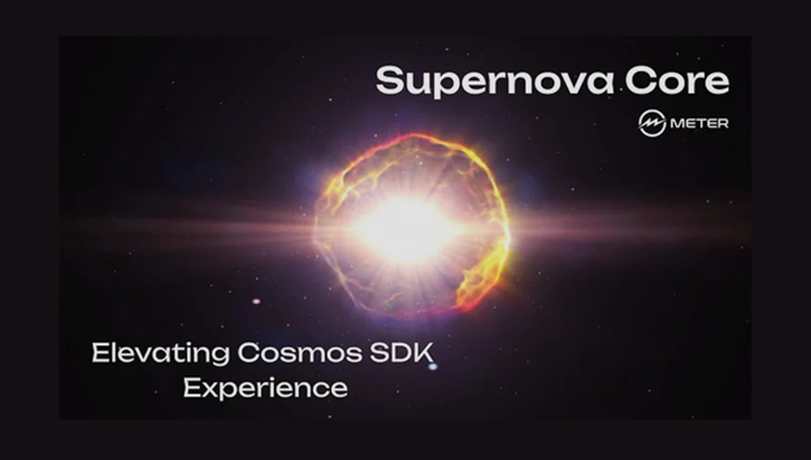Meter launches Supernova Core: A Cosmos SDK-compatible framework to address blockchain scalability and performance challenges

Cosmos SDK-based blockchains face significant hurdles in scaling effectively. As validator networks expand, existing consensus mechanisms often falter, creating performance bottlenecks that slow transaction throughput. Inefficient network communication and the overhead of validator consensus messages exacerbate these issues.
Additionally, integrating Ethereum Virtual Machine (EVM) functionality into these systems has proven difficult, limiting opportunities for cross-chain development. Now, blockchain startup Meter is stepping up to address these challenges.
Today, Meter announced the launch of Supernova Core, an open-source framework designed to tackle these limitations. Compatible with the Cosmos SDK, the new consensus engine aims to improve blockchain scalability and performance while maintaining decentralization.
What Makes Supernova Core Different?
Supernova Core replaces CometBFT and incorporates technologies like HotStuff consensus algorithms and BLS signature aggregation. These innovations are intended to enhance network throughput and allow validator sets to exceed 150 nodes without sacrificing efficiency.
By maintaining compatibility with the Cosmos SDK, Supernova Core aims to simplify the adoption process for developers already building within the ecosystem. It retains familiar tools while introducing performance improvements, such as reduced communication overhead and faster finality.
Proven Performance from Existing Use Cases
Supernova Core isn’t an experimental concept—it has already been operational on the Meter mainnet for over four years. According to Meter, the consensus engine has supported a network of more than 300 validators and processed up to 8 million daily transactions. This extensive operational history demonstrates its capacity to handle high transaction volumes under challenging conditions.
In addition, Supernova Core features an optimized peer-to-peer (P2P) network design that improves the efficiency of validator communication, further reducing bottlenecks in high-load scenarios.
Developer Accessibility and Flexibility
The framework also addresses one of the Cosmos ecosystem’s key limitations: the lack of seamless EVM compatibility. Supernova Core supports Ethereum-native tools and smart contracts, enabling developers to integrate cross-chain functionality without significant modifications to their existing workflows.
Its architecture separates transaction ordering from state processing, creating a foundation for high-performance Layer 2 solutions. This design aims to balance decentralization with the performance needed for demanding applications, such as decentralized finance (DeFi).
Open Source and Future Enhancements
Supernova Core is available for open-source review on GitHub, with plans for testnet deployment in the near future. Future updates include support for parallel EVM execution and an optimized database structure, which Meter says will improve performance and streamline developer workflows.
Meter describes itself as a high-performance blockchain platform that prioritizes decentralization and scalability. It emphasizes a focus on building an infrastructure capable of supporting modern blockchain applications while addressing economic challenges with its metastable coin.




